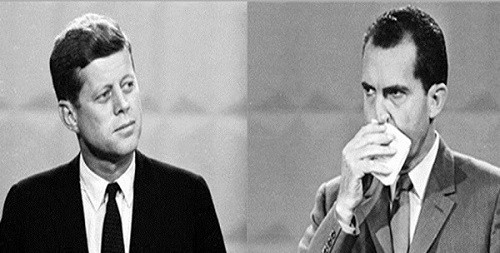Who Will be President? All Bets Are Off Until the Debates.
Chris Roberts, American Renaissance, August 2, 2020
Anyone trying to predict who will win the 2020 presidential election should recall how close the vote was in several key states last time. Michigan, Pennsylvania, and Wisconsin went to Donald Trump by less than one percent; Florida went to Mr. Trump by less than two percent. Combined, these four states have 75 electoral votes. If Hillary Clinton won them, she would have become president.
That is why the results of the 2018 midterm election are so troubling: In 2020, nearly every vote is likely to count, Mr. Trump doesn’t have any to spare, and his 2016 coalition is fraying.
| Group | Democrat in 2016 | Republican in 2016 | Democrat in 2018 | Republican in 2018 |
|---|---|---|---|---|
| all white college grads | 45% | 48% | 53% | 45% |
| all whites with no degree | 29% | 66% | 37% | 61% |
| female white college grads | 51% | 44% | 59% | 39% |
| male white college grads | 39% | 53% | 47% | 51% |
| male whites with no degree | 23% | 71% | 32% | 66% |
| female whites with no degree | 34% | 61% | 42% | 56% |
While it is true that Barack Obama saw his party lose congressional and senatorial seats during his first midterm but then won reelection, he had breathing room that President Trump does not. In 2008, Sen. Obama won the popular vote by 7.9 percent and the electoral college by 192 votes, meaning he could lose support after four years in office and still win in 2012. And that is exactly what happened: President Obama won reelection with a margin of 3.9 percent of the popular vote and 126 electoral votes. President Trump can’t afford even half that much of a loss of support and still win.
Recent polls have uniformly pointed to a victory for Joe Biden. And while the polls in 2016 were mostly wrong, they were off by about 3 or 4 percent. If we assume the same error in 2020’s polls, Mr. Biden still wins because the polls put him so far ahead.
NEW @FoxNews Poll (7/18-20)#Pennsylvania:
Biden 50% (+11)
Trump 39%
.#Minnesota:
Biden 51% (+13)
Trump 38%
.#Michigan:
Biden 49% (+9)
Trump 40%— Political Polls (@Politics_Polls) July 23, 2020
The Trump campaign and many of its surrogates are bending over backwards to win black and Hispanic votes, but these efforts are unlikely to pay off — they haven’t worked for any other Republican candidate. In 2016, eight percent of blacks and 28 percent of Hispanics voted for Mr. Trump, and those numbers are unlikely to change much, no matter how desperately some believe otherwise:
It’s pretty clear they’re freaking out about losing the black vote. Which they do deserve to lose.
Prediction: Trump gets 30% of the black vote.
— Dave Rubin (@RubinReport) February 8, 2020
But the reason I am not completely convinced Mr. Trump will be a one-term President is what he might achieve in debates with Joe Biden. During both his fight for the Republican nomination and against Mrs. Clinton, Mr. Trump did well in the debates. He never lost his cool, always delivered memorable jabs, and got under his opponents’ skins.
Meanwhile, Joe Biden is very gaffe-prone, tends to ramble, and has occasional aggressive outbursts:
Three debates, each lasting an hour and a half, will highlight this contrast to tens of millions of Americans. President Trump will certainly interrupt his opponent repeatedly and aggressively, and Mr. Biden may well get tripped up over this, start to stammer and repeat himself, and then blow up. Clips of this will be played on every news channel, and will be shared over and over on social media.
Presidential debates have consequences. The first one to be televised was in 1960, between John F. Kennedy and Richard M. Nixon. Don Hewitt, who produced and directed the debate, commented that JFK looked “tan and fit. . . a matinee idol,” while Nixon was “green, sallow, needed a shave,” and looked “like death warmed over.” Sen. Kennedy won that election by only 112,827 votes, and many believe that showcasing his good looks on TV gave him the boost that put him over top. Nixon appears to have agreed; he refused to participate in any televised debates in 1968 and 1972.

John F. Kennedy and Richard M. Nixon during their televised debate in 1960.
In 1976, during a debate with Jimmy Carter, President Gerald Ford said, “There is no Soviet dominance of Eastern Europe.” When pressed on this by the moderator, the President dug himself a deeper hole. This comment was talked about in the press for days, with only a month left before the election. Just like Nixon in 1960, President Ford lost narrowly.
There were similar headline-inspiring debate moments in 1984 and 1988, which you can watch below. Every presidential candidate (though not every vice presidential candidate) considered to have completely dominated his opponent during a debate won the election. Every candidate considered to have made a major gaffe during a debate lost.
President Trump needs a miracle to win this November. The debates may well give him one.















